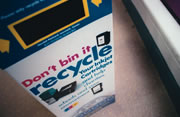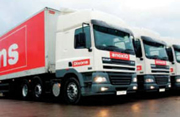
Above: Customers are encouraged to recycle
their used inkjet cartridges in-store.

Above: Company vehicles are tested regularly
to minimise their impact on the environment.
|
 |
We have made good progress towards our aim of fully integrating environmental considerations into all areas of our business. Our focus remains on materials use, waste management and energy and fuel consumption. Other issues are addressed as their impact is identified.
- We recycled 153 tonnes more
distribution level waste paper than
in 2000/01
- 51 tonnes of redundant customer
mobile phones were collected and
processed for reuse or recycling, up
400% on last year
- We sold 33 per cent more ‘A’ rated energy efficient appliances
than in the previous year
- We reduced our fleet car carbon dioxide emission levels to an
average of 161gms/litre, (beating the Government’s target of 165gms/litre)
- New stores fitted with modified air conditioning fans reduced
their energy use by up to 9 per cent
- We achieved a 20 per cent reduction
in refrigerants used by air conditioning
systems at our out-of-town stores.
Further details of our objectives and targets and how these are managed are set out at www.dixons-group-plc.co.ukBenchmarking performance
The Group has participated in the Business in the Environment (BiE) Index of Corporate Environmental Engagement since it began six years ago. This is a respected benchmark of FTSE 100 companies’ environmental management and performance. In this year’s more detailed survey the company maintained its position in the upper half of its economic group. BiE commented as follows: “Environmental management scores were strong and consistent with last year. High scores were achieved in the leadership, policy, objective, target setting, environmental stewardship and employee communications areas. Progress could be made by expanding the company’s internal environmental audit process. “Performance measurement results are consistent with last year with some improvements made in the setting of performance targets. It is pleasing that, with the exception of energy, some performance improvement can be shown in all impact areas. The choice of biodiversity as a selected impact area is commendable and indicates the Group’s commitment to continual improvement.” Two illustrations of our programmes are set out below. Packaging recycling
Recycling of distribution product packaging, including cardboard,
paper and expanded polystyrene has increased by 9.2 per cent to
2,286 tonnes over the last financial year. This reflects continuing
efforts across the distribution chain to recover and segregate packaging
to prevent it from being consigned to landfill. Recovered materials
are reused for packaging. Investment in new equipment to bale plastic
film has increased the average monthly amount of film collected
from 3.5 tonnes in 2001 (calendar year) to five tonnes per month
in 2002. This will help the Group to achieve its target to increase
distribution packaging recycling levels by a further 10 per cent
by the end of April 2003. (See table 2.)
Energy saving
As the Government has highlighted, increasing the use of energy efficient appliances is key to reducing carbon dioxide emissions.
Currys has developed schemes to promote the replacement of older
appliances with new efficient models under the Energy Efficiency
Commitments Programme (EEC). An ‘A’ rated energy efficient fridge
can save £46 from the annual household electricity bill compared
with the average 10-year-old ‘G’ rated model.
Currys ran three exclusive schemes to promote energy efficient
products with TXU Energi and Powergen during the year. These offered
customers savings of up to £150 off the retail price of ‘A’ rated
appliances. In total Currys sold more than 70,000 ‘A’ rated appliances
in 2001/02, supported by national advertising and in-store literature.
Table 1
Business in the Environment Index of Corporate and Environmental Engagement. |
| General retail sector: |
|
| |
|
| Dixons’ results |
2001 |
 |
| Overall ranking* |
107 |
 |
| Average score |
66% |
 |
| Economic group ranking** |
22 of 52 |
 |
| Sector ranking |
5 of 7 |
 |
| FTSE 100 ranking* |
55 |
 |
* The total number of participating companies was 206 including 83 FTSE
100 companies.
** The economic group containing general retail includes leisure, entertainment,
hotel, media, transport and support related businesses and services. |
Table 2
Package recycling per year in tonnes. |
| |
Card |
Paper |
Plastic film |
Polystyrene |
Total tonnage |
% change |
 |
| 1999/00 |
1,348 |
- |
- |
253 |
1,601 |
|
 |
| 2000/01 |
1,689 |
142 |
15 |
248 |
2,094 |
+31% |
 |
| 2001/02 |
1,675 |
295 |
60 |
256 |
2,286 |
+9.2% |
 |
Collection and recycling of paper and plastic film were not measured until
2000. |
|